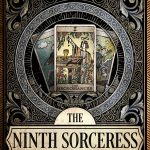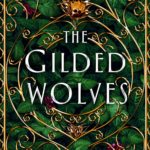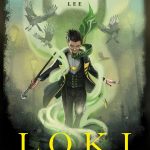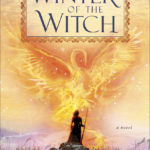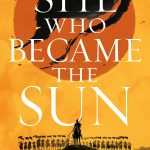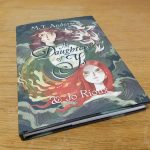Much Ado About “Loveless” – Book Review
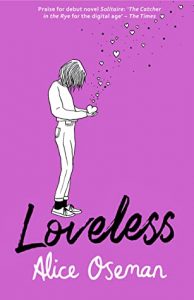
Loveless by Alice Oseman has an aromantic-asexual main character and is written by an aromantic-asexual author. Its authentic voice hit me harder than I expected it to.
Loveless was included with great anticipation on my list of aromantic and asexual Pride reads last month. I could hardly wait to get my hands on it and as soon as it arrived, I devoured it. Loveless isn’t Alice Oseman’s first book, and throughout it there’s a sense of a master hand at the tiller. Each twist and turn is carefully navigated, the characters are beautifully well-drawn, and there are little symbolic touches here and there that lend the story a real sense of tapestry.
The heart of Loveless is the relationships between the central characters: Georgia, our aro-ace protagonist, and her friends Pip, Jason, and Rooney. These relationships are built up with perfect pacing, sweet little in-jokes, and text conversations that actually feel like real-life text conversations and not an author trying to write text conversations – something that’s surprisingly hard to pull off, so I’ve found.
While there is a great angsty romance between a couple of the characters, it’s the friendships that mostly take the spotlight, which is just what I’d hoped for. None of the characters are perfect and they do make mistakes, and Oseman investigates the repercussions of those mistakes with a deft touch.
I have to admit that about halfway through the book, my opinion of it started to be colored by an emotion that I hadn’t expected: jealousy. I read this story about a fellow British person also on the aromantic and asexual spectrums going to university and experiencing events that I’ve also experienced – Freshers’ Week, Society Fairs, having college parents, bonding with the people living in my halls – and as I read it, I found myself getting more and more jealous of the main character.
Georgia happens to meet an asexual person, who helps her figure herself out; Georgia gets invited along to a Pride event purely by chance, which helps, too; Georgia is helped out of her shell by fellow queer people; Georgia has someone close to her also come out as aromantic-asexual. Reading her story was like wish fulfillment crossed with ‘what could have been’. It felt good to read, and it also hit me hard.
The way Georgia goes into potential romantic or sexual experiences in the book rang so true to me: on the surface, a shoulder-shrug attitude of hey, if it doesn’t work out with this person, it’ll be okay. And underneath, a deep-seated fear that this encounter or relationship could be my only shot at finding myself in the kind of love story that’s held up as the pinnacle of human happiness – all the while, kind of knowing that I don’t really fit in that story. Watching Georgia figure it out brought a lot of my own heartbreak to the surface, and reminded me of emotions I haven’t felt for a few years since I figured myself out a little better.
There were places where I felt the book lash out at me, though, rather than extending a hand. A couple of lines in particular stand out. Without spoiling who it is, someone close to Georgia comes out to her as aromantic-asexual, and this person describes to Georgia how she tried for years to force herself to enjoy having sex with various different people.
“I felt a wave of relief that I had never let myself go that far,” Georgia thinks in response. “Maybe I was a little stronger than I thought.”
In general the book does an incredibly good job of understanding why aro-ace people might force ourselves into romantic and sexual situations, just to try to make it work, perhaps even unaware under all the internalized heteronormativity that this isn’t what we really want. But these two lines seem to belie a lot of that, and frankly they upset me.
I can see how for aro-aces who have never forced themselves to go further than they were comfortable with, it’s validating to see it written as a show of strength instead of the childishness or coldness that’s more often the narrative when it comes to a personal dislike of romance or sex. The implied flip side of the statement, however, is that Georgia is looking at this aromantic-asexual person who has gone through hook-ups and dates she never wanted, and thinking that she’s weaker for it.
It’s only two lines in the book but I almost put Loveless down and couldn’t finish it. The sentiment, that an aromantic-asexual person is weak when they’ve forced themselves into sexual or romantic experiences and stronger when they haven’t, felt like a slap in the face. Georgia frames as weakness the confusion and desperation and pain of someone trying to make sex or dating work, and it’s a blow that the rest of the book seems to be trying to soothe. It reminds me of the “gold-star lesbian” narrative, with the implication that there’s a good and strong way to be queer, and there’s also a bad and weak way.
On an intellectual level I can coolly and thoroughly disagree; on an emotional level, though, I’m just hurt. To be clear, I don’t think it’s bad writing – I can easily imagine a teenage aromantic-asexual character who’s still figuring it all out having a thought like that. As we realize we aren’t part of the hetero world, and perhaps can’t ever enjoy the romantic and sexual experiences that our society sees as victories, it’s easy to fall into competition with other queer people – find solace in the idea that we might be doing better or worse than others in our peer group. It’s totally realistic that Georgia might fall into that line of thinking. I don’t think the characterization is bad. It did upset me badly, however.
Since I felt so close to this book and its main character, it’s easy for me to be critical, and I don’t want to fall into the trap of tearing apart a book that’s making the effort while later I’ll be giving a pass to stories that don’t even bother to include aromantic or asexual characters. Loveless is in so many ways an absolute triumph, a heartfelt and detailed and vulnerable story written in a truly fun and really engaging style. The cast of characters still feel real to me after having turned the final page. I loved so much of it, and a lot of what Georgia went through helped me to understand myself better.
The book also explores inter-personal and moral boundaries in a way that feels thoughtful and and nuanced. When Georgia treats the people around her badly, the book balances the reader’s understanding of what Georgia was doing with a dose of pathos for the people confused and upset by her choices. While I’m not a fan of the trope where a queer person has to prostrate themselves in abject apology for the mistakes they made as they tried to figure themselves out, the book takes on the issue with humanity and care, with both sides offering understanding and apology.
Loveless is the most intimate and understanding book with an aromantic-asexual character that I’ve ever read. I have already recommended it to friends and I hope that they’ll read it. It has so many beautiful moments, and I’m so glad it exists in the world.
Author: Em Rowntree
I’m a non-binary writer, teacher, and cat-lover from the UK.
Help support independent journalism. Subscribe to our Patreon.
Copyright © The Geekiary
Do not copy our content in whole to other websites. If you are reading this anywhere besides TheGeekiary.com, it has been stolen.Read our

